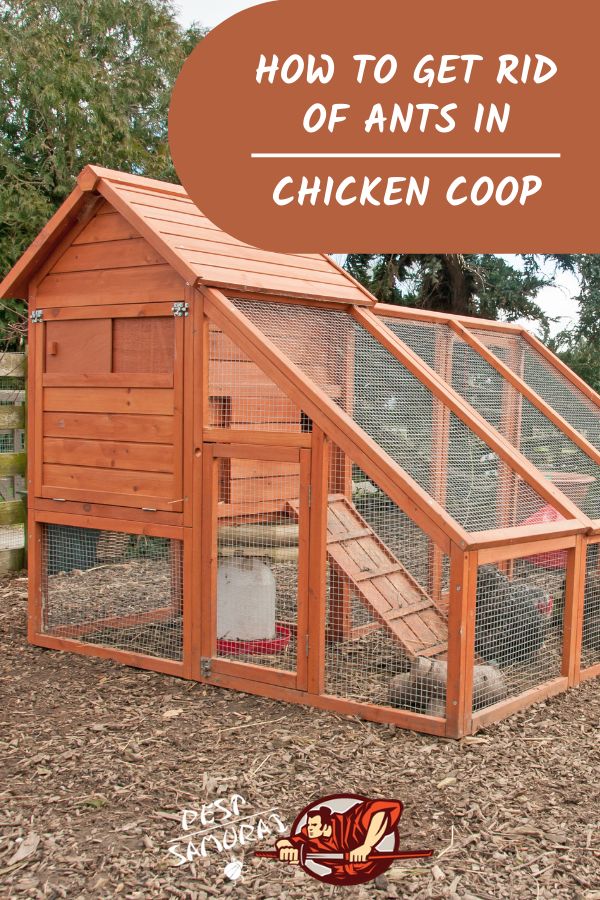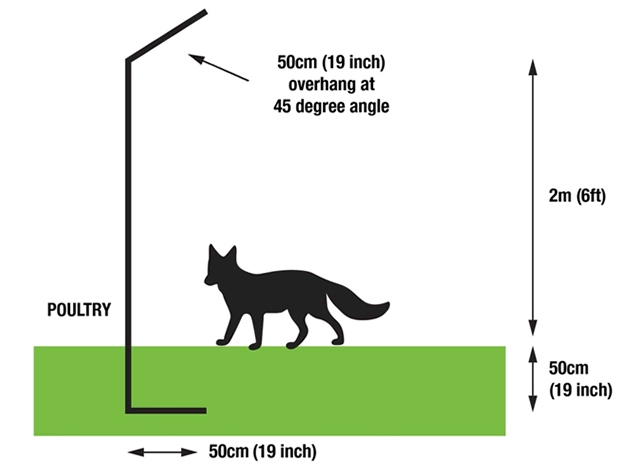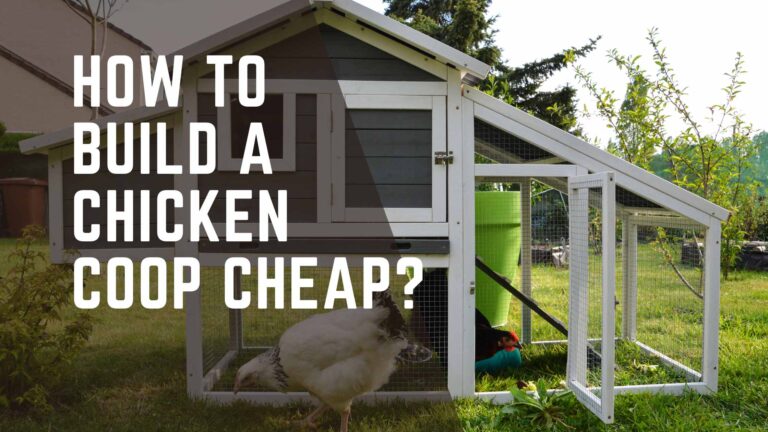Chicken coops need windows to provide ventilation and natural light. Properly placed windows can enhance a coop’s environment.
Ensuring your chickens have a comfortable living space is crucial for their health and productivity. Chicken coops with windows not only help regulate the temperature by providing adequate airflow but also allow sunlight to enter, which is essential for the birds’ circadian rhythms and egg production.
Do Chicken Coops Need Windows? Sunlight exposure helps chickens synthesize Vitamin D, vital for bone health and egg quality. Additionally, windows can decrease the coop’s humidity level, reducing the risk of respiratory issues and bacterial growth.
A strategic window placement can deter predators while keeping the coop secure. It’s important to balance the coop’s design with sufficient window space to maintain a healthy environment for your feathered friends.

The Importance Of Light In Chicken Coops
Ensuring your chickens have enough light is crucial for their well-being and productivity. Light exposure directly influences chickens’ behavior, health, and egg-laying capabilities. Understanding the need for proper lighting in your coop is key to raising happy, healthy hens.
Natural Light Vs. Artificial Light For Hens
Chickens thrive on routine and light is a significant factor in establishing their daily cycles. Let’s explore the benefits of both natural and artificial lighting in a chicken coop setting.
- Natural light
- Provides Vitamin D
- Regulates biological cycles
- Reduces electricity costs
- Artificial light
- Ensures consistent light
- Promotes year-round egg production
- Controls light intensity and duration
How Light Affects Egg Production
Light triggers the pituitary gland in hens which in turn influence egg production. With the ideal lighting conditions, hens are capable of producing eggs more efficiently and consistently.
| Light Exposure | Egg Production Level |
|---|---|
| Longer daylight | Higher rates |
| Limited daylight | Lower rates |
Targeting a balance of 14-16 hours of light per day can optimize egg production in hens. Younger hens require a gradual increase in light, whereas older hens can handle more sudden changes.
Design Considerations For Chicken Coop Windows
When planning your chicken coop, windows are more than just a visual aid. These features turn a simple enclosure into a vibrant habitat for your chickens. Let’s discuss the design aspects that ensure happy and healthy poultry.
Optimal Window Placement For Sun Exposure
Strategic window placement maximizes sun exposure and keeps chickens in tune with natural daylight cycles. Consider east-facing windows for the morning sunlight and shade in the afternoon to avoid overheating.
- Position windows above roosting height.
- Ensure even light distribution inside the coop.
- Avoid direct drafts onto roosting areas.
Window Size And Ventilation Benefits
Proper window size is crucial for adequate ventilation. It reduces moisture, ammonia, and prevents respiratory issues.
| Window Feature | Benefit |
|---|---|
| Larger windows | Boost air circulation |
| Adjustable openings | Control airflow, easy to clean |
| Mesh screens | Keep predators out |
Ensure windows open and close for weather adaptation. Offer cross ventilation without strong drafts for a comfortable environment.
- Match window size to coop size.
- Consider multiple small windows instead of one large one.
- Place windows high for security and air flow.
Health And Behavior: Impact Of Windows In Coops
Understanding the influence of windows in chicken coops reveals surprising benefits for poultry health and behavior. Just like humans, chickens need natural light and fresh air for wellbeing. Not just any coop setup will do—let’s peek into the perks of having windows in these feathery residences.
Sunlight’s Role In Hen Health
Windows bring essential sunlight into a chicken coop. Sunlight provides vitamin D, key for calcium absorption and strong eggshells. Here are some additional sunlight benefits:
- Boosts Immunity: UV rays help fight off bacteria, keeping diseases at bay.
- Regulates Cycles: Natural light helps maintain laying patterns, crucial for egg production.
- Improves Mood: Sunlight can prevent behavioral issues, promoting a stress-free environment.
Behavioral Benefits For Confined Chickens
In confined spaces, windows can have a significant impact on chicken behavior. They offer an environmental enrichment that can lead to positives such as:
| Reduced Aggression: | Windows allow birds to see outside, lowering pecking and fights. |
| Better Foraging: | Chickens stay active, mimicking natural foraging with the light variations. |
| Stimulation: | Outside views offer mental engagement, keeping chickens alert and curious. |

Credit: www.thegardencoop.com
Security Concerns With Chicken Coop Windows
Ensuring the safety of your chickens involves more than just sturdy walls and a roof. Windows in chicken coops present unique security concerns that must be addressed to protect your flock from harm. From the threat of predators to the challenges posed by harsh weather, coop windows require careful consideration.
Protecting Your Flock From Predators
Windows can be weak points in coop security. Predators can breach these openings if they are not designed properly. Here’s how to secure them:
- Install sturdy wire mesh behind the windows to prevent any unwelcome visitors.
- Use locks or latches on windows to keep them firmly closed when necessary.
- Ensure windows are high enough off the ground to deter predators from reaching them.
By taking these steps, you can sleep soundly knowing your chickens are safe from nighttime raiders.
Weatherproofing Windows For Safety
Coop windows face nature’s elements. Weatherproofing is essential for the health of your flock. Here are tips for keeping your coop windows safe:
- Use weather-resistant materials for window frames and sills.
- Seal gaps and cracks to keep moisture and cold air out.
- Install windows that can be easily opened or closed depending on the weather.
By weatherproofing your coop windows, you ensure a comfortable and safe environment for your chickens year-round.
Seasonal Considerations For Coop Windows
Planning your chicken coop design means thinking about the seasons.
Windows play a vital role in keeping your flock comfortable.
But each season brings unique challenges. Your coop must adapt to keep chickens healthy.
Winter Challenges And Insulation Options
- Windows lose heat. Small coops get cold quickly.
- Seal edges well. Use weather stripping.
- Use insulated glass or double-pane windows. They keep heat in.
- Cover windows with plastic. It’s a budget-friendly insulator.
- Remember sunlight. It warms the coop for free.
Managing Overheating In Summer
- Ventilation is key. Windows let air move through.
- Cross breeze helps. Place windows opposite each other.
- Use window covers. Shade cloth or blinds reduce heat.
- Position is important. Mount high windows for hot air escape.
- Consider opening size. Larger openings increase airflow.
Material Choices For Coop Windows
Material Choices for Coop Windows play a vital role in chicken coop design.
Windows provide essential light and air to your feathered friends.
They also keep the coop warm in winter and cool in summer.
But what materials work best for these windows?
Let’s dive into three popular materials: Glass, Plexiglass, and Hardware Cloth.
Comparing Glass Vs. Plexiglass Vs. Hardware Cloth
| Material | Pros | Cons |
|---|---|---|
| Glass |
|
|
| Plexiglass |
|
|
| Hardware Cloth |
|
|
Durable Framing For Longevity
The right frame increases a window’s lifespan. Choose materials that withstand weather and time. Strong frames like aluminum or treated wood are top picks. They resist rot and pests, essential for coop durability. Well-built frames also secure the windows firmly, keeping your chickens safe.
Diy Chicken Coop Windows
Whether you’re a backyard farmer or homesteading newbie, adding windows to your chicken coop can transform the health and happiness of your feathered friends. Natural light stimulates egg production. It keeps your coop fresh. Let’s roll up our sleeves for those ready for a weekend project, and dive into creating custom windows for your chicken coop.
Step-by-step Guide To Installing Windows
Tools and materials: Collect tools like a saw, drill, and screws. Choose a window design. Measure twice, cut once.
- Mark the Area: Sketch the window outline on the coop wall.
- Cut the Hole: Saw along the marks. Keep lines straight.
- Frame the Window: Attach wooden strips around the hole as a frame.
- Place the Window: Sit the window into the frame. Check if it’s level.
- Secure the Window: Screw the window to the frame. Make it tight.
- Weatherproof: Caulk around the edges. Keep moisture out.
Tips: Mind ventilation. Fit a mesh screen for predator defense.
Cost-effective Materials For The Homemade Coop
Thriftiness Wins: Let’s economize. Use materials like plexiglass or salvaged windows for the coop.
- Plexiglass: Cheap, durable, easy to cut.
- Salvaged Windows: Find these at yard sales or reclaim centers. Save cash and recycle.
- Polycarbonate Sheets: Another budget choice. Tough against pecking.
Ensure materials are safe. Avoid sharp edges or harmful coatings.
| Material | Pros | Cons |
|---|---|---|
| Plexiglass | Low cost, lightweight | Less insulating |
| Salvaged Windows | Cost-saving, eco-friendly | Varying sizes and shapes |
| Polycarbonate Sheets | Impact-resistant | More expensive than plexiglass |
Remember to measure your space. Fit the window to your coop’s scale. Bigger isn’t always better.

Credit: theinspiredworkshop.com
Must-know Tips For Chicken Coop Window Maintenance
Chicken coop windows hold the key to a healthy and vibrant flock. Regular maintenance is crucial to ensure your feathered friends receive enough sunlight and fresh air. Our guide provides essential tips for keeping coop windows in tip-top shape.
Cleaning And Upkeep For Optimal Light
Clean windows mean more sunlight for your chickens. Sunlight keeps your chickens happy and helps them lay eggs. Here’s how to maintain that sparkle:
- Use natural cleaners like vinegar and water to avoid harmful chemicals.
- Wipe regularly to prevent grime and dirt buildup.
- Check for cracks and repair any damage to prevent drafts.
Seasonal Adjustments For Window Function
Coop windows must adapt to changing seasons. Adjust for weather conditions to protect your chickens from extreme temperatures. Follow these steps:
- Install screens or covers to keep pests out in the summer.
- Add insulation kits in winter for warmth.
- Ensure proper ventilation while preventing drafts.
Regular window checks will make your chickens safe and comfortable all year round.
Conclusion
In sum, windows are an essential feature of a well-designed chicken coop. They ensure ample light, vital for the flock’s health and egg production. Proper ventilation also keeps diseases at bay. To maximize the benefits, position and size the windows thoughtfully.
A well-lit coop means happy chickens and plentiful eggs for your table.






